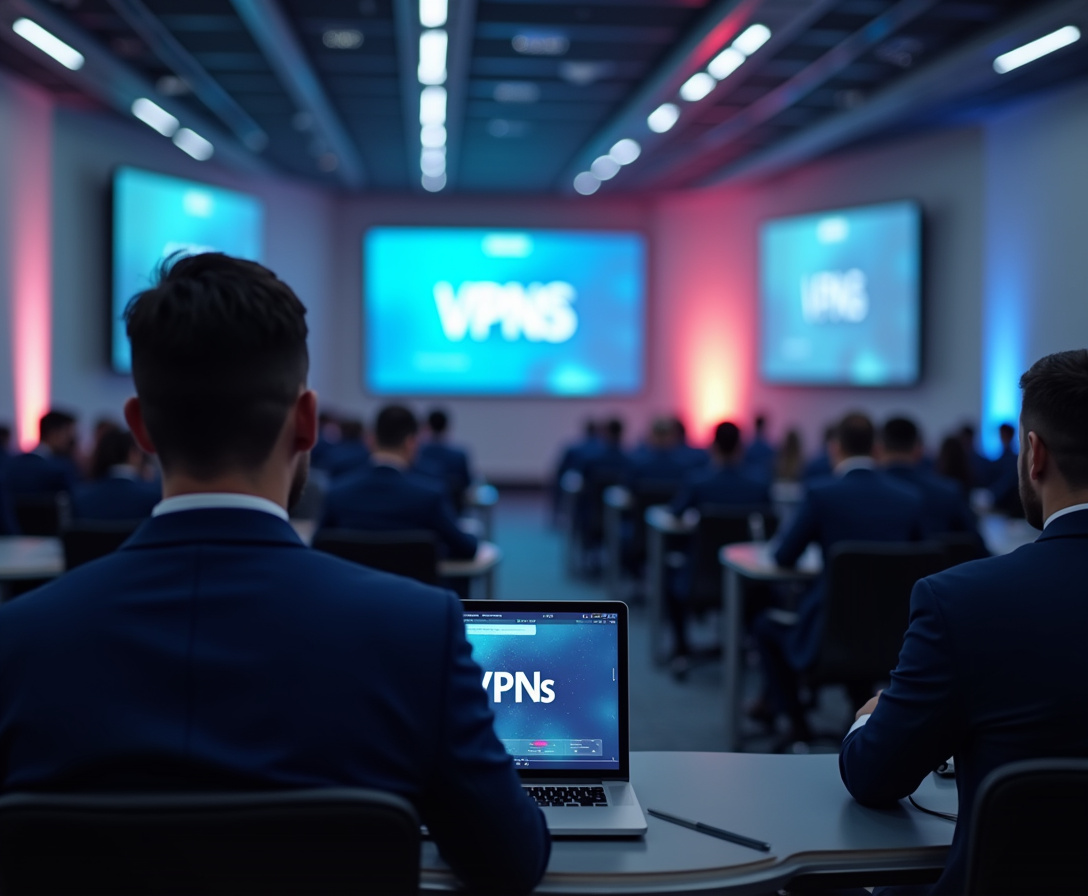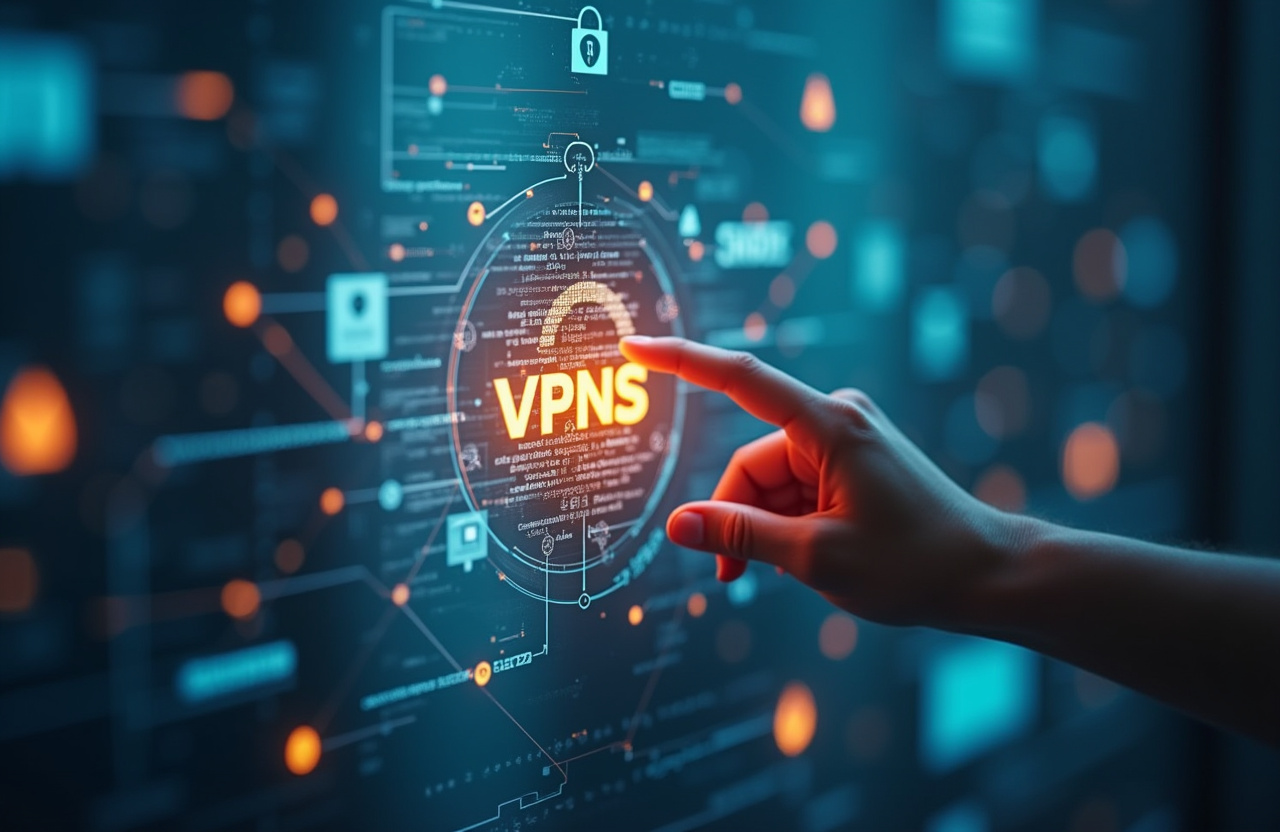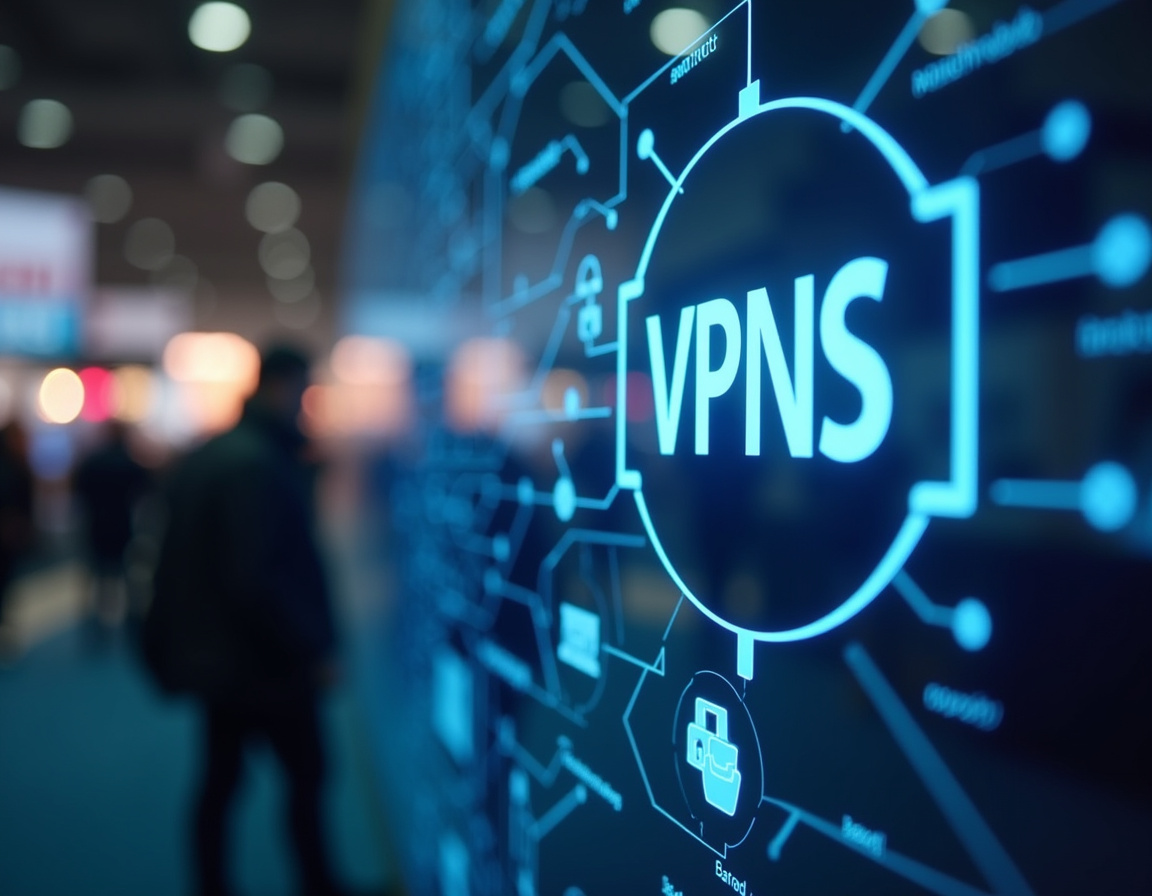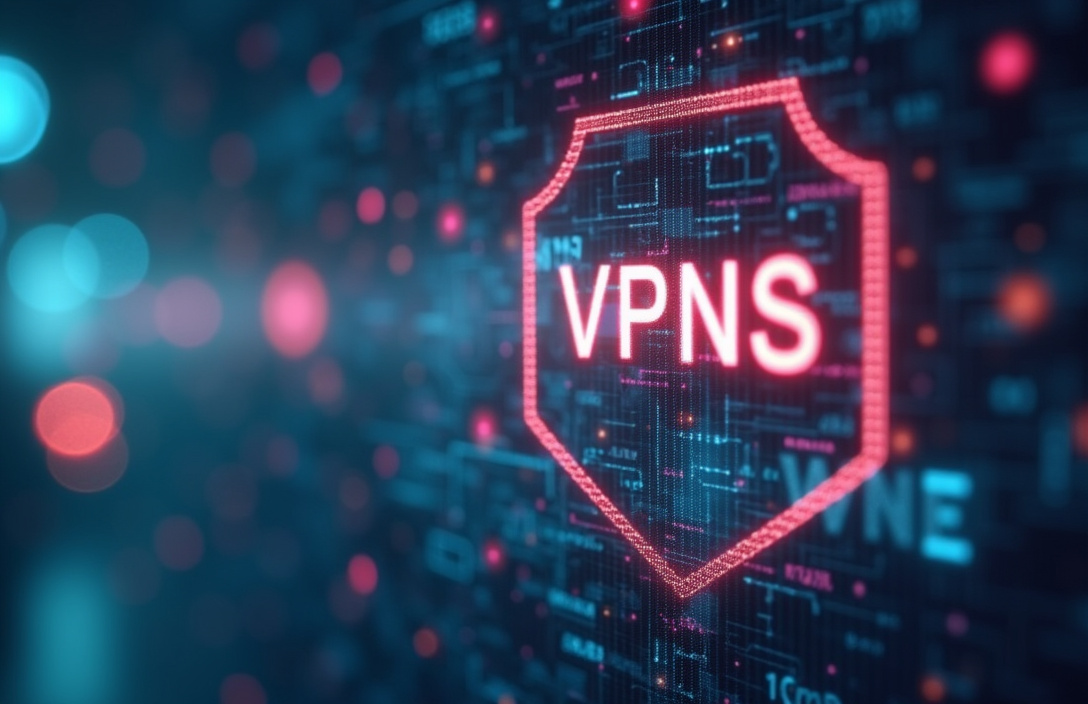VPNs for Conference Organizers: Securing Event Details
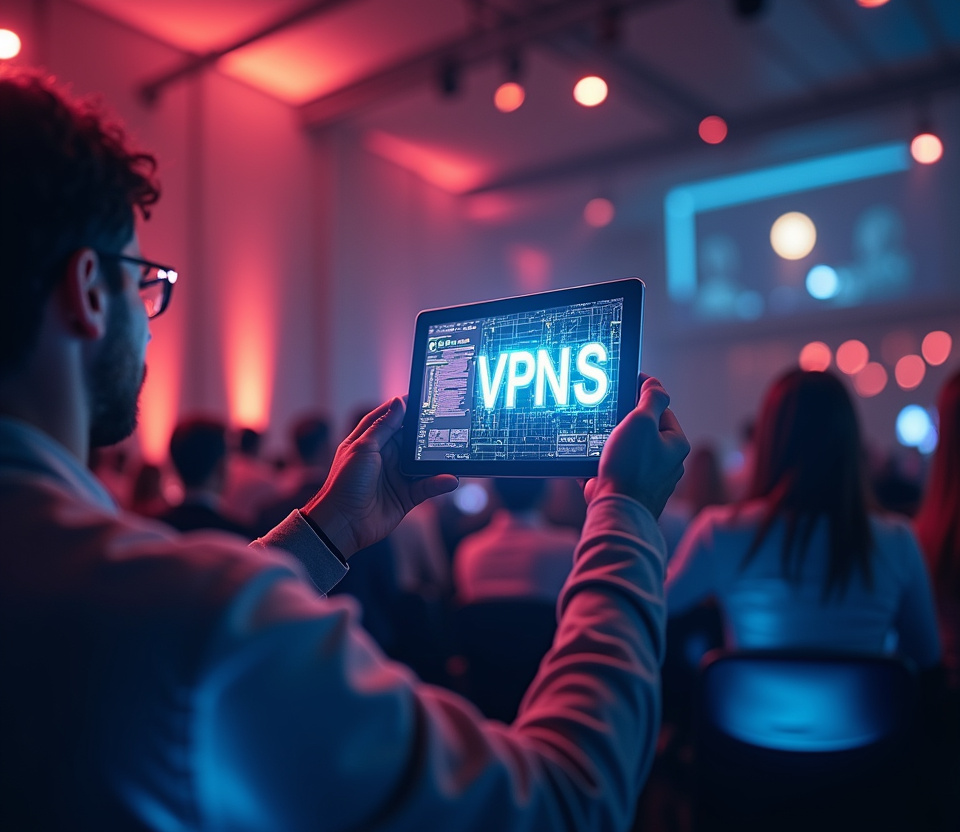
Table of Contents
VPNs for Conference Organizers: Securing Event Details and Ensuring Attendee Protection
In today's interconnected world, conferences and events have become increasingly reliant on digital technologies for various aspects, from registration and ticketing to communication and data management. This digital transformation has undoubtedly streamlined event operations and enhanced attendee experiences. However, this reliance also introduces significant cybersecurity risks, making it crucial for conference organizers to prioritize the security of event details, attendee information, and communication channels to maintain trust and prevent potentially devastating breaches.
Failing to adequately address these security concerns can lead to reputational damage, financial losses, legal liabilities, and a compromised attendee experience, jeopardizing the overall success of the event. A Virtual Private Network (VPN) offers a robust and readily deployable solution for mitigating these risks and ensuring a secure event environment. More than just a simple piece of software, a VPN creates an encrypted tunnel, a secure pathway for data transmission, between a user's device and the internet.
This digital fortress effectively safeguards sensitive data from unauthorized access, interception, and manipulation. Think of it as a private highway through the often-unsecured public internet. This encrypted connection masks the user's real IP address, replacing it with one from the VPN server, making it significantly more difficult for cybercriminals to track online activity and target specific devices or individuals.
This anonymity not only protects attendees from potential surveillance but also prevents targeted attacks aimed at extracting sensitive information. Moreover, a VPN can bypass geo-restrictions, allowing attendees to access content and services that may be unavailable in their physical location due to censorship or regional licensing agreements, further enhancing their overall conference experience. Imagine an attendee from overseas unable to access essential conference materials hosted on a website blocked in their country; a VPN neatly resolves this issue, ensuring equitable access to information for all participants.
Event security, at its core, hinges on ensuring the confidentiality (keeping data secret), integrity (ensuring data is accurate and unchanged), and availability (making data accessible when needed) of critical information. A VPN plays a vital role in achieving these core security objectives by encrypting all data transmitted over the network, preventing eavesdropping and data breaches. Imagine the scenario of a conference organizer sharing highly confidential speaker presentations, sensitive attendee data like contact details and dietary requirements, or critical financial reports discussing sponsorship deals and budget allocations over an unsecured public Wi-Fi network at the event venue.
Without a VPN, this data could be easily intercepted by hackers lurking on the same network, potentially leading to reputational damage that harms future events, significant financial losses due to compromised financial data, and legal liabilities related to breaches of privacy regulations. A conference VPN acts as a protective shield, ensuring that all data remains private and secure, even when using inherently vulnerable public Wi-Fi hotspots. This is particularly important in high-traffic environments like conferences where numerous devices are simultaneously connected to the same network, increasing the potential attack surface.
Beyond data encryption, a VPN enhances attendee protection by masking their IP addresses and preventing online tracking by advertisers, malicious actors, and even government entities in certain regions. This is particularly important for attendees who may be concerned about their privacy or who are attending events in countries with strict internet censorship laws or where expressing certain opinions might put them at risk. By using a VPN, attendees can browse the internet anonymously and securely during the conference, without fear of being monitored, tracked, or targeted.
Communication security is an equally critical aspect of overall event wellbeing, especially when organizers, staff, speakers, and attendees rely on various digital communication channels such as messaging apps, email, and video conferencing for organizing and participating in the event. A VPN encrypts all communication channels, preventing unauthorized access to sensitive information shared during these vital interactions.
VPNs: A Secure Solution for Event Management
The use of a conference VPN extends beyond simply encrypting data in transit; it also strengthens authentication processes and access control measures, forming a robust defense against unauthorized access. By requiring attendees and staff to connect to the event network through a VPN, organizers can implement a more secure means of verifying their identities and granting them appropriate access privileges based on their roles and responsibilities. This significantly reduces the risk of insider threats and external attacks aimed at gaining unauthorized access to sensitive resources.
Consider the scenario of a rogue employee, either disgruntled or compromised by a social engineering attack, attempting to access confidential attendee lists containing sensitive personally identifiable information (PII), or delving into financial records to uncover potentially damaging information. Without stringent access controls enforced through a VPN, such unauthorized access could be easily achieved, leading to severe consequences. With a VPN in place, access can be granularly restricted based on user roles and permissions, preventing unauthorized access and effectively minimizing the risk of data breaches.
For instance, only designated staff members should have access to attendee payment information, while other staff might only require access to attendee names and contact details for logistical purposes A VPN facilitates this level of control, ensuring that individuals only have access to the information they absolutely need to perform their duties. Furthermore, a VPN can be configured to require multi-factor authentication (MFA), adding a crucial extra layer of security to the login process and making it significantly more difficult for malicious actors to breach the network. While a password might be compromised through phishing or brute-force attacks, MFA requires users to provide two or more forms of identification, such as a password combined with a one-time code sent to their registered mobile phone or biometric authentication via fingerprint or facial recognition.
This significantly elevates the security hurdle for attackers, reducing the risk of unauthorized access even if they manage to compromise a user's password. Attendee protection is of paramount importance for any conference or event, as it directly impacts the overall reputation and success of the occasion. A VPN contributes significantly to creating a safe online environment for attendees by shielding them from an array of potential cyber threats and online scams that are increasingly prevalent in public Wi-Fi environments.
Public Wi-Fi networks, commonly found at conference venues, hotels, and surrounding areas, are notoriously unsecured and often represent an easy target for hacking attempts. Cybercriminals can effortlessly intercept unencrypted data transmitted over these networks, including sensitive usernames, passwords, credit card information, and personal communications. A VPN effectively addresses this vulnerability by encrypting all data transmitted over public Wi-Fi, rendering it unreadable to eavesdroppers and protecting attendees from identity theft, financial fraud, and other cybercrimes that can have devastating personal and professional consequences.
Moreover, a VPN can actively prevent attendees from falling victim to sophisticated phishing scams and malicious websites designed to steal their credentials and information. These deceptive tactics are frequently employed by cybercriminals to trick unsuspecting attendees into divulging sensitive information, such as conference login credentials, financial details relevant to travel bookings, or even proprietary information related to their own organizations. A robust VPN solution can proactively block access to known phishing websites identified on threat intelligence feeds and alert users to potential threats before they can be compromised, helping them avoid falling victim to these scams.
Communication security represents a cornerstone not only for internal communications between organizers, staff, and speakers but also extends to sensitive external communications with sponsors, crucial vendors, and esteemed keynote participants. Sharing confidential information with these external parties demands a secure communication channel to prevent unauthorized disclosures and uphold critical confidentiality agreements and reputations. A VPN furnishes such a secure means of communication by encrypting all data exchanged between the organizer and external stakeholders.
This ensures that highly sensitive information, such as sponsorship agreements detailing financial commitments, speaker contracts outlining intellectual property rights, and financial details pertaining to event budgeting, remains private and protected from unwarranted intrusion.
Bypassing Geo-Restrictions
Selecting the optimal conference VPN solution is a critical decision that directly impacts the overall effectiveness of event security measures. Not all VPNs are created equal, and significant variations exist in the levels of security features, performance capabilities, and privacy policies offered by different providers. Therefore, organizers must conduct a thorough evaluation of different VPN options based on several key factors to ensure they choose a solution that adequately protects their event and its participants.
Encryption strength is arguably the most fundamental factor to consider when choosing a VPN for a conference setting. The strength of the encryption algorithm dictates the level of protection afforded to data transmitted through the VPN tunnel. The most robust encryption protocols currently available, such as Advanced Encryption Standard (AES) with a 256-bit key (AES-256), provide the highest level of security, making it exceptionally difficult for even the most sophisticated hackers to decrypt intercepted data.
Opting for a VPN that employs weaker encryption protocols can leave sensitive data vulnerable to compromise, negating the primary purpose of using a VPN in the first place. Server locations are also an important consideration, as they can directly impact connection speed, latency, and access to geo-restricted content. A VPN with a geographically diverse and extensive network of servers allows attendees to connect to servers in their preferred locations, potentially improving their browsing experience by minimizing latency and bypassing regional censorship restrictions that might prevent access to certain online resources.
Furthermore, the proximity of a VPN server to a user's physical location can often significantly affect connection speed, with closer servers generally offering faster and more reliable connections. Logging policies are another crucial factor to consider, particularly for organizations that prioritize attendee privacy. A VPN with a strict no-logs policy demonstrates a commitment to protecting user data and ensures that the provider does not collect or store any potentially sensitive user information, such as browsing history, IP addresses, connection timestamps, or data transfer volume.
This prevents user data from being shared with third parties, including law enforcement agencies or advertisers, ensuring a higher level of privacy and anonymity for attendees. Organizations should carefully review the VPN provider's privacy policy to fully understand their data logging practices and ensure they align with their own privacy standards. Ease of use is also a paramount consideration, especially given that many attendees may not be technically savvy or familiar with VPN technology.
A VPN with a user-friendly interface, intuitive navigation, and a straightforward setup process is essential for ensuring that attendees can easily connect to the network and enjoy secure browsing without requiring extensive technical assistance. VPNs that offer one-click connection options and auto-configuration features can be particularly beneficial for non-technical users. Beyond these technical considerations related to the software itself, conference organizers should also develop and implement a comprehensive VPN usage policy for both attendees and staff members.
This policy should clearly outline the purpose of using the VPN, establish acceptable usage guidelines, and provide detailed security best practices aimed at protecting sensitive information and preventing security breaches. The policy should also address any potential limitations or restrictions associated with VPN usage, as well as the consequences of violating the policy. The VPN usage policy should be effectively communicated to all attendees and staff members, and compliance should be actively monitored and enforced to ensure the security of the conference network.
A well-defined VPN usage policy serves as a critical component of an overall conference security plan, helping to minimize risks and protect sensitive data. The policy could include stipulations like mandatory VPN use on public Wi-Fi, a prohibition on accessing illegal content through the VPN, and guidelines for creating strong passwords.
Ensuring Data Confidentiality, Integrity, and Availability
Effective implementation of a conference VPN requires careful planning, configuration, and ongoing management to ensure optimal security and performance. It's not simply a matter of subscribing to a VPN service and expecting it to magically solve all security concerns. Organizers need to consider various logistical and technical aspects to seamlessly integrate the VPN into their existing event infrastructure and provide a positive user experience for attendees.
Before deploying a VPN, organizers should conduct a thorough assessment of their network infrastructure to identify potential vulnerabilities and ensure compatibility with the VPN solution. This assessment should include evaluating the bandwidth capacity of the network, the number of concurrent connections that need to be supported, and the existing security measures in place. Based on this assessment, organizers can determine the appropriate VPN configuration and select a VPN provider that can meet their specific needs.
One crucial decision involves choosing between a client-based VPN and a router-based VPN. With a client-based VPN, attendees and staff need to install VPN client software on their devices and manually connect to the VPN server each time they want to access the network securely. This approach offers flexibility and control, but it can be cumbersome for users who are not familiar with VPN technology.
A router-based VPN, on the other hand, involves configuring a VPN connection directly on the event's router, so that all devices connected to the router automatically use the VPN. This approach simplifies the connection process for attendees, but it requires more technical expertise to set up and maintain. Regardless of the deployment method, it's essential to properly configure the VPN to maximize security and performance.
This includes selecting a strong encryption protocol, configuring appropriate firewall rules, and enabling features like kill switch and DNS leak protection. A kill switch automatically disconnects the user from the internet if the VPN connection drops, preventing data from being transmitted over an unsecured network. DNS leak protection prevents the user's DNS requests from being sent to their ISP's DNS servers, which can reveal their location and browsing activity.
Once the VPN is deployed, organizers need to monitor its performance and usage to ensure that it's functioning properly and that attendees are using it correctly. This can involve tracking connection logs, monitoring bandwidth usage, and providing technical support to attendees who are experiencing issues. It's also important to regularly update the VPN software and security policies to protect against emerging threats and vulnerabilities.
Beyond the technical aspects of VPN implementation, organizers should also focus on educating attendees and staff about the importance of using a VPN and how to use it effectively. This can involve providing clear and concise instructions on how to install and connect to the VPN, as well as explaining the benefits of using a VPN for security and privacy. Organizers can also conduct training sessions or workshops to demonstrate how to use the VPN and answer any questions that attendees may have.
Furthermore, organizers should clearly communicate their VPN usage policy to attendees and staff, outlining the acceptable uses of the VPN and the consequences of violating the policy. This policy should be easily accessible and regularly reviewed to ensure that it remains relevant and effective. By educating attendees and staff about the importance of VPN usage, organizers can foster a culture of security and ensure that everyone is playing their part in protecting the event and its participants.
Finally, remember that a VPN is just one component of a comprehensive event security strategy. It should be used in conjunction with other security measures, such as strong passwords, multi-factor authentication, and regular security audits, to provide a layered defense against potential threats.
In conclusion, deploying a conference VPN represents a proactive and essential security measure for event organizers aiming to protect sensitive event details, attendee information, and communication channels from an ever-evolving landscape of cyber threats. It's more than just a technical solution; it's a reflection of an organization's commitment to safeguarding the privacy and security of its attendees, speakers, sponsors, and staff. By implementing a VPN, organizers create a secure digital environment that fosters trust and confidence, encouraging participants to engage fully in the event without fearing their data will be compromised.
The importance of attendee protection cannot be overstated. In an era where data breaches are commonplace and personal information is highly valued by cybercriminals, providing a secure browsing experience is a fundamental responsibility of event organizers. A VPN effectively shields attendees from the risks associated with using public Wi-Fi networks, preventing identity theft, financial fraud, and other cybercrimes that can have devastating consequences.
Communication security is equally vital, especially given the reliance on digital communication channels for organizing and participating in events. A VPN encrypts all communication, ensuring that sensitive information shared between organizers, staff, speakers, and external stakeholders remains private and protected. Selecting the right VPN solution involves a careful assessment of various technical and logistical factors, including encryption strength, server locations, logging policies, ease of use, and compatibility with existing network infrastructure.
Organizers should also develop a comprehensive VPN usage policy, educate attendees and staff about the importance of using a VPN, and monitor the performance and usage of the VPN to ensure that it's functioning effectively. A well-implemented VPN is a powerful tool for enhancing event security, but it's not a silver bullet. It should be used in conjunction with other security measures, such as strong passwords, multi-factor authentication, regular security audits, and comprehensive data loss prevention (DLP) strategies, to create a layered defense against potential threats.
DLP strategies can identify sensitive data being transmitted and prevent it from leaving the secure environment without proper authorization. Looking ahead, the role of VPNs in conference security is likely to become even more critical as events continue to embrace digital technologies and the cyber threat landscape becomes increasingly complex. Emerging technologies, such as artificial intelligence (AI) and machine learning (ML), are being used by cybercriminals to develop more sophisticated attacks, making it essential for event organizers to stay one step ahead.
AI-powered security solutions can help organizations proactively identify and respond to potential threats, but a VPN remains a foundational element of a robust security strategy. Furthermore, as data privacy regulations become stricter, organizations will need to demonstrate that they are taking appropriate measures to protect attendee information. Implementing a conference VPN is a clear indicator of an organization's commitment to data privacy and can help them comply with regulatory requirements.
In conclusion, investing in a conference VPN is a smart and strategic decision for event organizers who prioritize security, privacy, and attendee well-being. It's an investment that can pay dividends in the form of enhanced trust, reduced risk, and a more secure and successful event. By taking proactive steps to protect their events from cyber threats, organizers can create a positive and memorable experience for all participants, ensuring the long-term success of their conferences.
The future of event security lies in a proactive, layered approach, with VPNs playing a pivotal role in safeguarding data and ensuring a secure digital experience for all involved.
Stay Updated
Get the latest VPN news, tips, and exclusive deals to your inbox.

